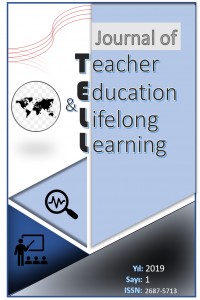Abstract
References
- Ekici, G. (2003). Uzaktan eğitim ortamlarının seçiminde öğrencilerin öğrenme stillerinin önemi. Hacettepe Üniversitesi Eğitim Fakültesi Dergisi. Sayı: 24, 48- 55.
- Federico, P. A. (2000). Learning styles and student attitudes toward various aspects of network-based instruction. Computers in Human Behavior, 16(4), 359-379.
- Grasha, A. F. (2002). The Dynamics Of One-On-One Teaching. College Teaching, 50 (4), 139-146.
- Grasha, A. F. ve Riechmann, S. W. (1974). A Rational Approach to Developing and Assessing the Construct Validity of a Student Learning Style Scales Instrument. The Journal of Psychology , 87, 213-223.
- Güngör, C. & Aşkar, P. (2004). E-öğrenmenin ve bilişsel stilin öğrenci başarısı ve internet öz yeterlik algısı üzerindeki etkisi. Hacettepe Üniversitesi Eğitim Fakültesi Dergisi, 27, 116-125.
- Gürol, M. & Sevindik, T. (2001). İnternet tabanlı uzaktan eğitim uygulamaları. Türkiye’de internet Konferansları(inet-tr) - 7, İstanbul.
- Haznedar, Ö. (2012). Üniversite Öğrencilerinin Bilgi Ve İletişim Teknolojileri Becerilerinin Ve E-öğrenmeye Yönelik Tutumlarının Farklı Değişkenler Açısından İncelenmesi. Yayınlanmamış Yüksek Lisans Tezi, Dokuz Eylül Üniversitesi Eğitim Bilimleri Enstitüsü, İzmir.
- Karasar, N. (2006). Bilimsel araştırma yöntemleri. Nobel Yayınevi, Ankara, 2006.
- McNutt, L. & Brennan, M. (2005). Work in progress – learning styles and elearning, what is the connection? 35th ASEE/IEEE Frontiers in Education Conference, Indianapolis.
- Özgür, H. & Tosun, N. (2010). İnternet destekli eğitimin e-öğrenme tutumlarına etkisi. XV. Türkiye'de İnternet Konferansı, İstanbul.
- Peker, M. (2003). Öğrenme Stilleri ve 4 MAT Yönteminin Öğrencilerin Matematik Tutum ve Başarılarına Etkisi. Yayınlanmamış Yüksek Lisans Tezi, Gazi Üniversitesi Sosyal Bilimler Enstitüsü, Ankara.
- Sarıtaş, E. & Süral, S. (2010). Grasha-Reichmann Öğrenme ve Öğretme Stili Ölçeklerinin Türkçe Uyarlama Çalışması. E-Journal of New World Sciences Academy, 5 (4).
- Şahin S. (2008). The relationship between student characteristics, including learning styles, and their perceptions and satisfaction in web-based courses in higher education. Turkish Online Journal of Distance Education-TOJDE, 9(1), 123-138.
- Tekinarslan, E. (2008). Attitudes of Turkish distance learners toward internet-based learning: an investigation depending on demographical characteristics. Turkish Online Journal of Distance Education-TOJDE, 9(1), 67-84.
Investigation of The Attitudes of Secondary School Students With Different Learning Styles For E-Learning
Abstract
In this study, it was aimed to investigate the attitudes of secondary school students with different learning styles towards e-learning. The
study is a descriptive research designed as a relationship survey method. The sample of the study consists of 360 students in a public school in Konya in the 2018-2019 academic year. “Grasha-Riechmann Learning Styles Scale” and “Attitude Scale Towards E-Learning” were used as data collection tools in the research. Data were analyzed using descriptive statistics, independent t test and one way ANOVA. Data were analyzed using SPSS 25.0 statistical package program. According to the results of the study, when the learning styles were ranked as preferred, the students (35.2%) had “Independent” and at least (5.6%) “Avoidant” learning styles. The mean scores of students' attitudes towards E-learning were 4,12. This value shows that students' attitudes towards E-learning are positive. As a result of the study, the attitudes of the students towards E-learning show a statistically significant difference according to their learning styles (F (358) = 42.86, p <.01).
Keywords
References
- Ekici, G. (2003). Uzaktan eğitim ortamlarının seçiminde öğrencilerin öğrenme stillerinin önemi. Hacettepe Üniversitesi Eğitim Fakültesi Dergisi. Sayı: 24, 48- 55.
- Federico, P. A. (2000). Learning styles and student attitudes toward various aspects of network-based instruction. Computers in Human Behavior, 16(4), 359-379.
- Grasha, A. F. (2002). The Dynamics Of One-On-One Teaching. College Teaching, 50 (4), 139-146.
- Grasha, A. F. ve Riechmann, S. W. (1974). A Rational Approach to Developing and Assessing the Construct Validity of a Student Learning Style Scales Instrument. The Journal of Psychology , 87, 213-223.
- Güngör, C. & Aşkar, P. (2004). E-öğrenmenin ve bilişsel stilin öğrenci başarısı ve internet öz yeterlik algısı üzerindeki etkisi. Hacettepe Üniversitesi Eğitim Fakültesi Dergisi, 27, 116-125.
- Gürol, M. & Sevindik, T. (2001). İnternet tabanlı uzaktan eğitim uygulamaları. Türkiye’de internet Konferansları(inet-tr) - 7, İstanbul.
- Haznedar, Ö. (2012). Üniversite Öğrencilerinin Bilgi Ve İletişim Teknolojileri Becerilerinin Ve E-öğrenmeye Yönelik Tutumlarının Farklı Değişkenler Açısından İncelenmesi. Yayınlanmamış Yüksek Lisans Tezi, Dokuz Eylül Üniversitesi Eğitim Bilimleri Enstitüsü, İzmir.
- Karasar, N. (2006). Bilimsel araştırma yöntemleri. Nobel Yayınevi, Ankara, 2006.
- McNutt, L. & Brennan, M. (2005). Work in progress – learning styles and elearning, what is the connection? 35th ASEE/IEEE Frontiers in Education Conference, Indianapolis.
- Özgür, H. & Tosun, N. (2010). İnternet destekli eğitimin e-öğrenme tutumlarına etkisi. XV. Türkiye'de İnternet Konferansı, İstanbul.
- Peker, M. (2003). Öğrenme Stilleri ve 4 MAT Yönteminin Öğrencilerin Matematik Tutum ve Başarılarına Etkisi. Yayınlanmamış Yüksek Lisans Tezi, Gazi Üniversitesi Sosyal Bilimler Enstitüsü, Ankara.
- Sarıtaş, E. & Süral, S. (2010). Grasha-Reichmann Öğrenme ve Öğretme Stili Ölçeklerinin Türkçe Uyarlama Çalışması. E-Journal of New World Sciences Academy, 5 (4).
- Şahin S. (2008). The relationship between student characteristics, including learning styles, and their perceptions and satisfaction in web-based courses in higher education. Turkish Online Journal of Distance Education-TOJDE, 9(1), 123-138.
- Tekinarslan, E. (2008). Attitudes of Turkish distance learners toward internet-based learning: an investigation depending on demographical characteristics. Turkish Online Journal of Distance Education-TOJDE, 9(1), 67-84.
Details
| Primary Language | English |
|---|---|
| Subjects | Other Fields of Education |
| Journal Section | Research Articles |
| Authors | |
| Publication Date | December 30, 2019 |
| Acceptance Date | December 11, 2019 |
| Published in Issue | Year 2019 Volume: 1 Issue: 1 |


